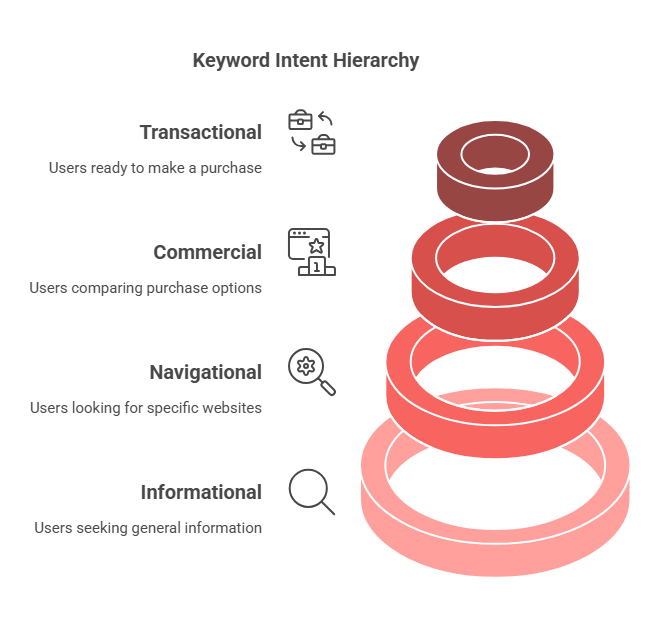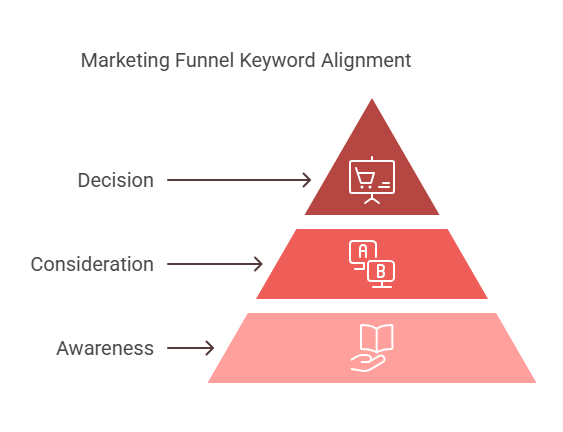Understanding how to do keyword research effectively can make or break your SEO strategy. As we navigate through 2025, the importance of finding the right keywords to target has only increased, with search engines becoming more sophisticated and user intent playing a crucial role in rankings.
Why Is Keyword Research Important for SEO Success?
Before diving into the process of how to do keyword research for SEO, let’s understand why it’s the foundation of any successful digital marketing campaign.
According to recent data, approximately 90% of web pages receive zero organic search traffic from Google. This striking statistic highlights a crucial reality: without proper keyword research, your content might never reach your target audience.
The breakdown of organic search traffic looks something like this:
- 80 million pages receive only 1-100 visitors
- 10 million pages receive 100-1,000 visitors
- Only 2 million pages receive more than 1,000 visitors
This data underscores why keyword research is important—it’s the difference between creating content that gets found and content that remains invisible in the vast digital landscape.
Understanding Search Intent: The Four Types of Keywords
Effective keyword research begins with understanding search intent. There are four primary types of keywords, each serving different stages of the customer journey:

1. Informational Keywords
These make up the majority of search queries and represent users seeking information. Think “how to,” “what is,” and other question-based searches. Informational keywords typically have:
- Higher search volume
- Lower conversion rates
- Great potential for top-of-funnel content
Interestingly, modern LLM models like ChatGPT, Claude, and Perplexity heavily leverage informational queries, making long-tail keywords increasingly valuable for visibility.
2. Navigational Keywords
These are primarily branded searches where users are looking for a specific website or page. Examples include “TikTok login” or “Amazon customer service.” These keywords:
- Indicate brand awareness
- Serve middle-of-funnel purposes
- Build trust and authority
3. Commercial Keywords
These indicate users comparing options before making a purchase decision. Examples include “best camera for beginners” or “Verizon business plans.” Commercial keywords:
- Show buyer interest
- Target middle-to-bottom funnel users
- Require content that addresses comparison points
4. Transactional Keywords
These represent users ready to make a purchase. Examples include “buy iPhone 16 Pro” or “restaurants near me.” These keywords:
- Have the highest conversion potential
- Target bottom-of-funnel users
- Often include terms like “buy,” “order,” “for sale,” or location-specific modifiers
Understanding these keyword types allows you to build a comprehensive SEO strategy that addresses every stage of your marketing funnel.
Aligning Keywords with Your Marketing Funnel
Each keyword type serves a different purpose in your marketing funnel:

Top of Funnel: Awareness Stage
- Primary keyword type: Informational
- Content formats: Blog posts, guides, how-to articles
- Goal: Establish expertise and introduce your brand
Middle of Funnel: Consideration Stage
- Primary keyword types: Navigational and Commercial
- Content formats: Comparison guides, case studies, detailed product information
- Goal: Build trust and position your offering as the solution
Bottom of Funnel: Decision Stage
- Primary keyword type: Transactional
- Content formats: Product pages, service descriptions, location pages
- Goal: Convert visitors into customers
Rather than focusing exclusively on high-conversion transactional keywords, a balanced approach that targets all funnel stages creates a more sustainable SEO strategy. This approach also supports E-E-A-T (Experience, Expertise, Authoritativeness, and Trustworthiness), which is a significant ranking factor. Building authority requires more than just good content.
Learn how to get backlinks to strengthen your site’s authority and improve rankings for your target keywords.
Creating Topic Clusters for Better SEO Performance
A strategic approach to keyword research involves creating topic clusters—groups of related content centered around a main “pillar” page. This structure:
- Establishes topical authority
- Creates logical internal linking opportunities
- Improves overall site architecture
- Helps search engines understand your site’s focus
For example, if you offer digital marketing services, your pillar page might focus on “Digital Marketing Services,” with cluster content covering specific areas like content marketing, video marketing, and influencer marketing. Each cluster can then contain more specific subtopics, all connected through strategic internal linking.
This approach not only helps search engines understand your site better but also provides multiple entry points for users at different stages of their journey.
Optimizing for Modern Search: Voice Search and Generative AI
As we progress through 2025, two key trends are reshaping how we conduct keyword research: voice search and generative AI engines.
Voice Search Optimization
Recent statistics show that 51% of voice search users look for restaurants and businesses online, making this an essential consideration for local businesses. When optimizing for voice search:
- Focus on natural, conversational long-tail keywords
- Structure content with clear question-and-answer formats
- Keep paragraphs short and direct
- Target featured snippet positions
Voice searches tend to be more question-based and conversational than typed queries, so incorporating question phrases like “how,” “what,” “where,” and “why” can improve visibility for voice search users.
Generative Engine Optimization
With the rise of AI-powered search experiences, optimizing for generative search engines requires specific strategies:
- Answer questions directly: Structure content with clear H2 or H3 headers framed as questions, followed immediately by concise answers
- Create scannable content: Use short paragraphs, bullet points, and structured information that’s easy for AI to parse
- Implement schema markup: Use appropriate schema markup (JSON-LD) to provide context about your content to search engines
- Focus on E-E-A-T signals: Demonstrate expertise, experience, authoritativeness, and trustworthiness throughout your content
These approaches not only improve visibility in traditional search engine results pages but also increase the chances of your content being featured in AI-generated responses.
Practical Keyword Research Strategies for 2025
Now that we understand the importance and theory behind keyword research, let’s explore practical strategies to conduct keyword research effectively.
Strategy 1: Find Low-Hanging Fruit Keywords
If you already have an established website, one of the quickest wins can come from optimizing for keywords you’re already ranking for in positions 10-20 (page 2 of search results).
How to find these opportunities:
- Use a tool like Semrush to analyze your current keyword rankings
- Filter results to show keywords ranking in positions 10-20
- Identify keywords with decent search volume and lower keyword difficulty
- Refresh and optimize the corresponding content to push these rankings onto page 1
This approach brings faster results than targeting entirely new keywords since Google already associates your site with these topics.
Strategy 2: Analyze Competitor Keywords with Gap Analysis
Understanding what keywords your competitors rank for—but you don’t—reveals valuable opportunities.
Steps to perform a competitor keyword gap analysis:
- Identify your main competitors
- Use a tool like Semrush’s Keyword Gap tool to compare your domain against theirs
- Focus on “missing keywords” that competitors rank for but you don’t
- Filter by search volume, keyword difficulty, and relevance to your business
- Prioritize keywords that align with your content strategy and business goals
This strategy helps you discover blind spots in your keyword coverage and identify opportunities your competitors have already validated.
Strategy 3: Use Free Keyword Research Tools
Not every business has the budget for premium SEO tools. Fortunately, several free keyword research tools can provide valuable insights:
Google Keyword Planner
Despite being designed for advertisers, Google’s Keyword Planner provides valuable organic search data:
- Sign up for a free Google Ads account (no need to run ads)
- Access the Keyword Planner tool
- Use either “Discover new keywords” or “Get search volume and forecasts”
- Input a competitor’s website to see what keywords they might be targeting
- Filter out branded terms to focus on non-branded keyword opportunities
The tool provides monthly searches, competition levels, and related keyword ideas that can form the foundation of your content strategy.
Other Valuable Free Tools:
- Google Search Console: Reveals which keywords are already driving traffic to your site
- Google Trends: Shows seasonal trends and relative popularity of search terms
- Answer the Public: Generates question-based keyword ideas around your main topics
- Google’s “Related searches”: Check the bottom of search results pages for keyword ideas
Strategy 4: Focus on Long-Tail Keywords
Long-tail keywords—more specific, longer phrases with lower search volume—often represent the best opportunities for new or smaller websites.
Benefits of targeting long-tail keywords:
- Lower competition and keyword difficulty
- Higher conversion rates due to specificity
- Better alignment with actual user questions
- Greater visibility in voice search and AI-generated results
For example, rather than targeting the highly competitive term “video editing software,” focus on more specific variations like “best video clipping software for YouTube shorts” or “AI video cutter for social media clips.”
Organizing Your Keyword Research Process
To conduct keyword research effectively, follow these steps:
- Define your goals: Determine what you want to achieve with your content (awareness, engagement, conversions)
- Identify seed keywords: Start with basic terms relevant to your business
- Expand with research tools: Use the tools mentioned above to discover related keywords
- Analyze search intent: Categorize keywords by the four types of search intent
- Evaluate keyword metrics: Consider search volume, keyword difficulty, and competition
- Prioritize opportunities: Create a keyword list organized by priority and funnel stage
- Map keywords to content: Assign primary and secondary keywords to existing or planned content
- Monitor and refine: Track keyword rankings and adjust your strategy based on performance
This systematic approach ensures your keyword research process is thorough and aligned with your overall SEO strategy.
Advanced Keyword Research Techniques for 2025
As search algorithms continue to evolve, implementing advanced keyword research techniques can give you a competitive edge. Let’s explore some sophisticated approaches to find the most valuable search terms for your business.
Analyzing Keyword Difficulty vs. Search Volume
When evaluating which keywords to target, consider both keyword difficulty and search volume:
- High search volume, high difficulty: These competitive keywords typically require significant SEO investment but can deliver substantial traffic. Best reserved for pillar content and established websites.
- High search volume, low difficulty: These “golden opportunity” keywords should be your highest priority, as they represent the best return on investment.
- Low search volume, low difficulty: Perfect for new websites or quick wins. While individual traffic may be modest, targeting multiple related low-competition keywords can add up to significant organic search traffic.
- Low search volume, high difficulty: Generally avoid these unless they have exceptionally high conversion potential for your specific business.
Creating a visual matrix of your keyword data can help prioritize which terms to target first in your content calendar.
Understanding Keyword Metrics Beyond Volume
While monthly search volume remains important, other keyword metrics provide crucial context:
- Click-through rate (CTR): Not all searches result in clicks. Some queries are answered directly in search engine results pages through featured snippets or knowledge panels.
- Seasonality: Many keywords experience significant seasonal fluctuations. Google Trends can help identify these patterns to align content publication with peak search periods.
- Cost per click (CPC): Even for organic SEO, high CPC values often indicate commercial value and conversion potential.
- Keyword trends: Is search volume increasing, decreasing, or stable over time? Growing trends may represent emerging opportunities.
- SERP features: What features appear for a given keyword? The presence of featured snippets, local packs, or shopping results affects organic CTR and strategy.
These metrics help you move beyond basic search volume data to make more informed decisions about which keywords truly deserve your attention.
Keyword Research for Different Content Types
Different content formats require adjusted keyword research approaches:
Blog Posts and Articles
For blog content, focus on:
- Informational and commercial keywords
- Question-based search terms
- Topics with featured snippet opportunities
- Related keywords that can be naturally grouped into comprehensive guides
The goal is to answer specific questions while providing enough depth to establish expertise.
Product and Service Pages
For transactional pages, prioritize:
- Bottom-of-funnel keywords with clear purchase intent
- Product/service-specific search terms
- Location modifiers for local businesses
- Comparison keywords (vs, alternative, best)
These pages should target keywords that align with immediate or near-term purchase intent.
Local SEO Keywords
For businesses serving specific geographic areas:
- Include location modifiers in your keyword research
- Target “[service] near me” variations
- Research neighborhood or district-specific terms
- Consider local landmarks or institutions in proximity keyword phrases
Google Business Profile insights can reveal valuable location-specific search terms your customers are using.
Building a Content Strategy from Your Keyword Research
Keyword research is most valuable when it directly informs your content strategy. Here’s how to transform your keyword data into actionable content plans:
Content Mapping
Create a content map that aligns keywords with specific pages:
- Group related keywords by topic cluster
- Assign primary and secondary keywords to each page
- Ensure every important keyword has a designated target page
- Identify content gaps where new pages are needed
This approach prevents keyword cannibalization (multiple pages competing for the same terms) and ensures comprehensive topic coverage.
Content Calendar Development
Develop a strategic content calendar based on your keyword research:
- Prioritize high-opportunity keywords
- Schedule seasonal content in advance of peak search periods
- Balance content across funnel stages
- Plan content clusters that support each other through internal linking
Rather than creating random content, this method ensures every piece serves a specific purpose in your SEO strategy.
Tracking and Refining Your Keyword Strategy
Keyword research isn’t a one-time activity. Effective SEO requires ongoing monitoring and refinement:
Regular Performance Analysis
Use Google Search Console, Google Analytics, and SEO tools to track:
- Keyword rankings over time
- Click-through rates for target keywords
- Conversions from organic search traffic
- New keyword opportunities as they emerge
Most successful websites conduct keyword research reviews quarterly, adjusting strategy based on performance data and market changes.
Competitor Rank Tracking
Monitor how competitors rank for your target keywords:
- Track ranking changes for key competitors
- Analyze content that outranks yours
- Identify new competitors entering your keyword space
- Observe competitor content strategies and angles
This intelligence helps you stay ahead of market shifts and adapt your approach accordingly.
Common Keyword Research Mistakes to Avoid
As you conduct keyword research, watch out for these common pitfalls:
- Ignoring search intent: Targeting keywords without understanding user intent leads to misaligned content that doesn’t convert.
- Focusing only on volume: High search volume doesn’t guarantee relevance or conversion potential for your specific business.
- Overlooking long-tail opportunities: Concentrating solely on high-competition head terms often means missing more attainable opportunities.
- Keyword stuffing: Modern SEO requires natural language optimization, not artificial keyword density.
- Neglecting competitor analysis: Failing to understand what’s already working in your niche means starting from scratch unnecessarily.
- Not updating keyword research: Search behaviors change over time, requiring regular refreshes of your keyword strategy.
Avoiding these mistakes will help you build a more effective, sustainable approach to keyword research.
Conclusion: The Future of Keyword Research
As we move through 2025 and beyond, keyword research continues to evolve with search technology. The rise of AI-generated search results, voice search, and increasingly sophisticated user intent analysis means keyword research must become more nuanced and user-focused.
The most successful SEO strategies will:
- Focus on answering specific user questions
- Create comprehensive content that covers topics thoroughly
- Optimize for conversational and natural language queries
- Structure content for both human readers and AI parsing
- Target keywords across the entire marketing funnel
By implementing the strategies outlined in this guide, you’ll be well-positioned to conduct effective keyword research that drives meaningful organic search traffic to your website.
Remember that the ultimate goal of keyword research isn’t just ranking—it’s connecting with the right audience at the right time with content that genuinely meets their needs. When your keyword strategy aligns with user intent and your business objectives, SEO becomes a powerful engine for sustainable growth.
Need help implementing these keyword research strategies for your business? I offer free video SEO audits for your website to provide personalized insights into improving your SEO strategy and driving more conversions. Work with the best freelance SEO consultant today!.







